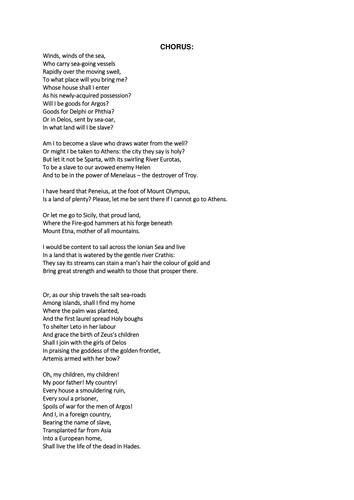









A note from the author:
I use this scheme of work with my Year 8 class, as not only does it offer a historical perspective on theatre, but it also allows for complex exploration into characters, ensemble work and strong emotions. The students seem to want to get fully involved in all aspects and I have developed this scheme over four years of teaching it. It involves a rich variety of activities, and supports the development of ensemble unison (both vocal and physical) and promotes positive working relationships in my students.
Objective Overview of Greek Theatre
§ Students to explore Greek Theatre elements such as chorus, characters comedy & tragedy, masks, depictions of gods, exaggerated acting.
§ Students to develop skills in unison movement, choral voice, non-verbal communication, tragic/comic characters, mask work, script exploration, and gestures.
§ Students to gain an introductory knowledge of Greek Theatre playwrights, Theatre practitioners (Complicitie, Jacques Lecoq), mythological characters, classical history and performance conditions.
§ Students to explore The Trojan Women in depth, as well as examples from The Frogs and The Clouds.
Overview of The Trojan Women
The Trojan Women follows Queen Hecuba, her daughter Cassandra, her daughter-in-law Andromache and her grandson Astyanax, as they learn of their fates to the conquering Greek army. Talthybius, a herald of the Greeks, shows great compassion for the Trojans but must deliver terrible news (the death of Astyanax, the burning of Troy, the separation of Cassandra and Andromache from Hecuba). Menelaus considers slaughtering his ex-wife Helen (of Helen of Troy fame, the face that launched 1000 ships) however he is won over by her charm and decides to delay her killing. Is Helen responsible for the whole Trojan War? The gods Poseidon and Athene start the play discussing how to kill the Greek Army after they offended Athene at her temple. This leads to the messages and themes of the futile nature of war, fate, free will and feminism. The play occurs at the same time as Euripides’ other play Hecuba.
Included:
In-depth Scheme of Work
Lesson Resources (Images, Worksheets, Handouts)
Scripts (a few chorus example scripts, self-written gesture scripts)
Assessment Instructions
Please note:
You may want to purchase ‘The Trojan Women’ by Euripides, and The Frogs and The Clouds by Aristophanes - however I have included two extracts from the plays plus some example chorus sections. The Trojan Women is the main resource for this SOW.
Please do comment on my resources so that I can continue to update and expand them. If you need any more information/clarification please comment and I will update my resources ASAP!
Get this resource as part of a bundle and save up to 44%
A bundle is a package of resources grouped together to teach a particular topic, or a series of lessons, in one place.
Something went wrong, please try again later.
Impressive detailed resource. I have a copy of The Frogs - which part did you envisage using as the optional comedy lesson? Thank you!
Report this resourceto let us know if it violates our terms and conditions.
Our customer service team will review your report and will be in touch.